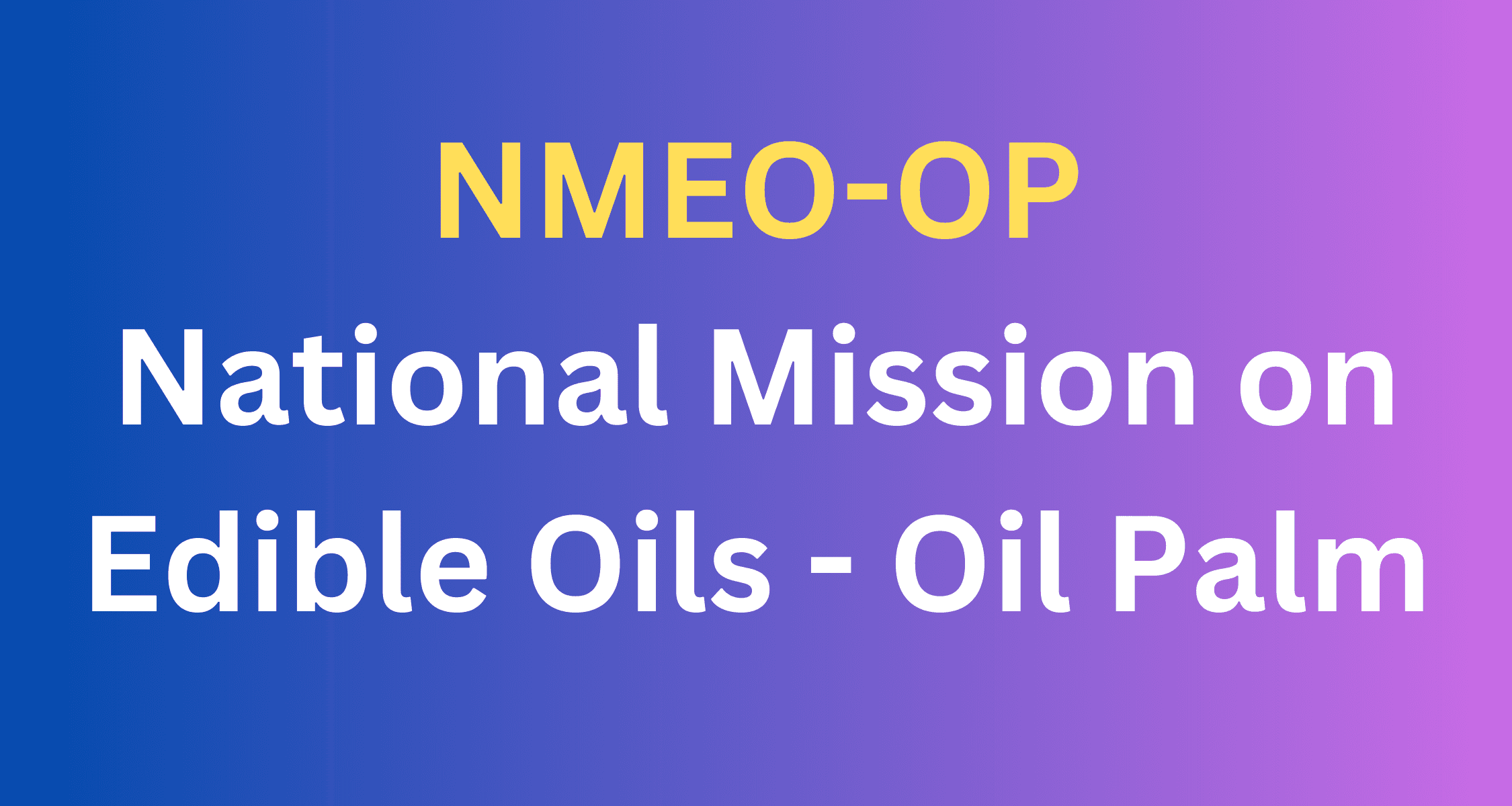National Mission on Edible Oils - Oil Palm (NMEO-OP)

India is a country where oilseed production plays a significant role. To reduce the growing demand for edible oils and dependence on imports, the Government of India has launched the National Mission on Edible Oils - Oil Palm. This scheme is designed to promote oilseed cultivation in the country and provide financial assistance to farmers.
Objectives of the National Mission on Edible Oils - Oil Palm
- Increase in Oilseed Production: The primary objective of this scheme is to increase the production of oilseeds in the country to meet the demand for edible oils. The consumption of edible oils in India is rising, and there is a need to boost local production to satisfy this demand.
- Reduce Dependence on Imports: Efforts are being made to maximize oilseed production in the country to reduce the import of edible oils. This will also save foreign exchange, improving the country’s economic condition.
- Provide Assistance to Farmers: Farmers will be provided with financial assistance for seeds, irrigation, maintenance, and harvesting tools. This will lower their production costs and increase their profits.
- Development of Underutilized Land: This scheme emphasizes converting undeveloped and barren land into productive land. This will allow for maximum utilization of land and contribute to food security.
Benefits of the National Mission on Edible Oils - Oil Palm (NMEO-OP)
- Financial Support: Under this scheme, the central and state governments provide financial assistance in a ratio of 75:25. This assistance is available at a ratio of 90:10 specifically in the northeastern states. This will provide greater help to farmers.
- Technical Assistance: Farmers are provided with technical support so that they can utilize modern farming techniques. This will enhance both the quality and quantity of production, allowing farmers to manage their crops more effectively.
- Reduce Rising Production Costs: The scheme aims to ensure that farmers receive fair prices, thereby safeguarding their economic interests. This will enable farmers to receive the correct value for their products, improving their standard of living.
- New Employment Opportunities: Increased oilseed production will generate new employment opportunities in rural areas, improving the rural economy. This will enhance the chances of employment for youth in villages.
- Environmental Protection: The scheme emphasizes the adoption of environmentally friendly farming practices, which helps in the conservation of biodiversity and ecosystems. This is crucial for long-term agricultural development.
Application Process for the National Mission on Edible Oils - Oil Palm
- Application Form: Get the application form from your state's agriculture department or agricultural university. You can also download the application form by visiting the relevant department's website.
- Required Documents: The necessary documents include your Aadhar card, ration card, residence certificate, land documents, and bank account details. The Aadhar card verifies your identity, while the ration card certifies family information. The residence certificate serves as proof of locality, and the land documents indicate ownership of agricultural land. Finally, bank account details are essential as the assistance will be transferred directly to your bank account.
- Application Form: Fill in all the required information accurately and ensure that all documents are correct. Carefully complete the application form to avoid any errors.
- Submit Application: Submit the completed application form and documents to the relevant department. Keep photocopies of all documents so that you can present them if needed.
- Follow-up: Stay in contact with the concerned authorities after submitting your application to know the status of the scheme. You should regularly check for updates regarding the progress of your application. For more information and to apply, click here.
Eligibility for the National Mission on Edible Oils - Oil Palm
- Must Be a Farmer: Only those individuals who are farmers and engaged in farming can benefit from this scheme. This scheme is for farmers who are capable of cultivating their crops.
- Ownership of Land: Farmers must own agricultural land. This land should be barren or underutilized, which can be utilized for oilseed production.
- Residency: The benefits of the scheme will only be available to those farmers who reside in the respective state. Farmers will receive benefits based on their place of residence.
Do you also want to benefit from the National Mission on Edible Oils - Oil Palm? Do you have any other questions related to this scheme? If so, please let us know in the comments. Additionally, if you want any other information related to farming, do let us know in the comments. If you found this information useful, please like it and share it with other farmer friends. To stay updated on government schemes for farmers, follow the 'Farmer's Scheme' channel.
Frequently Asked Questions (FAQs)
Q: Which is the largest palm oil-producing state in India?
A: Andhra Pradesh is the largest palm oil-producing state in India. This state has favorable climate conditions and agricultural schemes in place to promote palm oil cultivation, leading to higher production compared to other states.
Q: What is the National Mission on Edible Oils - Oil Palm?
A: This is a major initiative of the Government of India aimed at increasing palm oil production in the country and reducing dependence on oil imports. It includes financial assistance to farmers, technical knowledge, and plans to promote palm cultivation in areas with favorable climates.
Q: When was the National Food Security Mission launched?
A: The National Food Security Mission was launched in the year 2007-08. Its main objectives are to ensure food security in the country, increase productivity, and enhance the production of major grains.
Please login to continue

Get free advice from a crop doctor
